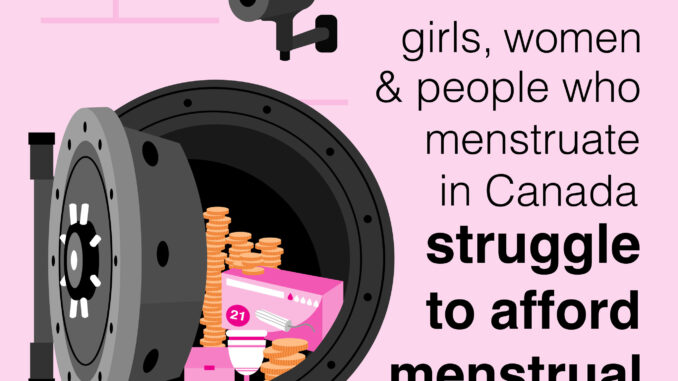
TORONTO, May 25, 2022 /CNW/ – One in five (21%) girls, women, and people who menstruate in Canada struggle to afford menstrual products for themselves or their dependents, according to new survey results released today by Plan International Canada.
Globally, the issue of period poverty affects 500 million people who don’t have access to menstrual supplies or safe washrooms. The lack of resources has negative effects on girls and young women, such as harming their health and causing them to miss school, and the shame associated with periods prevents them from full participation in everyday activities.
Launched for Menstrual Health Day, Menstruation in Canada – Views and Realities explores the impacts of periods among youth and adults aged 13 and older in Canada.
Key findings:
- More than four in five respondents who menstruate (83%) believe period products are too expensive.
- One in five (22%) ration or use products longer than they should because they can’t afford more. This rises to 33% among those with a household income of under $50,000, and 48% for Indigenous respondents.
- 95% of women and girls and 89% of men and boys support offering free menstrual products in schools.
To learn more, view the full report and download graphics and other resources.
The research also found that those who menstruate experience social stigma, such as being teased by others and feeling the need to hide their period. Two in three (66%) girls and women have heard having a period or PMS being used as an insult.
“We’ve seen some progress over the years on period poverty, but equitable access to menstrual products –availability and affordability to everyone, everywhere – is just the first step and the bare minimum. This ensures the dignity of every person who needs them, particularly those from vulnerable populations and in low-income countries. It is also critical from a hygiene and health perspective,” says Saadya Hamdani, Director of Gender Equality and Inclusion at Plan International Canada.
“The second step,” Hamdani adds, “is education to break stigma, misinformation, and shame surrounding periods, including teasing and bullying. This is a form of gender-based discrimination that has a negative impact on girls’ ability to participate fully in society.”
Ziyaan Virji, a Plan International Canada youth ambassador and founder of For the Menstruator says: “As someone who doesn’t menstruate, it’s imperative to approach those who do with empathy and help normalize an issue that impacts 1.8 billion people around the world every month.”
“There are already too many barriers to girls’ and young women’s empowerment – period poverty shouldn’t be one of them.”
- Saadya Hamdani, Director of Gender Equality and Inclusion, Plan International Canada
- Ziyaan Virji, Plan International Canada youth ambassador, menstrual equity activist and founder of For the Menstruator
- Bhanvi Sachdeva, Plan International Canada youth ambassador, menstrual equity activist and founder of Articulate Initiative
- Connect with us online: Twitter, Instagram, LinkedIn and Facebook
- Advocate for menstrual equity by using the hashtags #LetsTalkPeriods #MHDay2022
SOURCE Plan International Canada

Leave a Reply